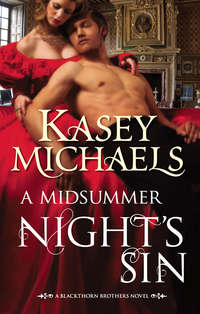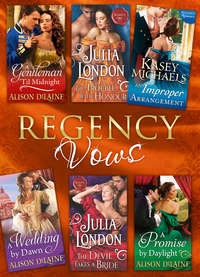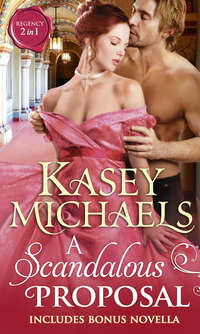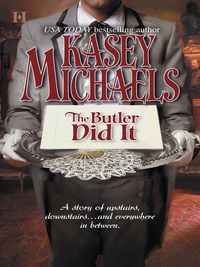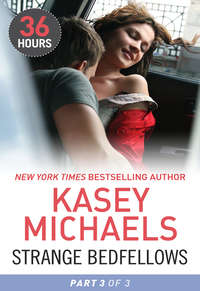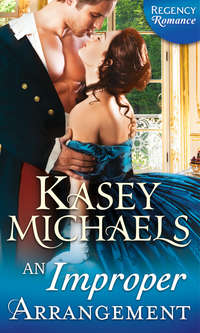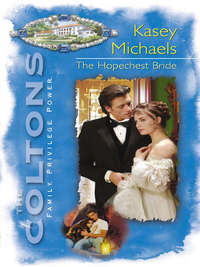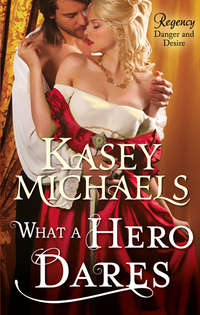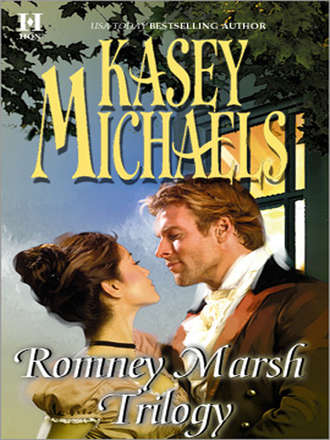
Полная версия
Romney Marsh Trilogy: A Gentleman by Any Other Name / The Dangerous Debutante / Beware of Virtuous Women
“I believe they buried the king’s man alive as he stood in a hole and tossed the other man down a dry well, then dropped rocks on him until he stopped moaning. But as you said, that was long ago.” Julia hugged herself, rubbed at her arms as a chill overcame her. “No, I’ll be all right. I believe you. That all happened very long ago. The world is much more civilized now. Besides, Billy has vouched for me,” Julia said. “Good night, sir.”
Chance let her get nearly to the door to her chamber before he stopped her, turned her around at the shoulders. “Jacko overheard us, remember? The man gossips like an old woman. By noon tomorrow, they’ll all think we’re lovers. That means you’re mine, and no one associated with Becket Hall would even think to harm anyone or anything that’s mine. I’m sorry I could come up with nothing better, but at that moment it was the only thing I could think of to…well, to shut you up. Do you want me to tell them otherwise?”
At last he had come close to admitting that, yes, there could be danger here at Becket Hall because of what they’d seen and heard on the Marsh. Julia felt her heart begin to race again and willed herself to be calm. “I knew what you were doing, once you did it. But I’m only the nanny. No one will care what our…association might be.”
“So you don’t mind being my mistress, Julia?” Chance asked her, drawing her closer.
“We both know I’m hardly that,” she said, hoping she sounded firm, sure of herself and unafraid of him. She couldn’t let him know how she felt as he stood so near, near enough for her to see the golden flecks in his stormy green eyes.
“True. But you’re a very brave woman, Julia. I saw that firsthand, out on the Marsh. And a very intelligent one, as well. No one here would be surprised that I’d found you…decidedly attractive.”
Why was she still standing there? Why was she still talking to him and not running into her room, hoping there was a key in the door so she could lock herself away from him, from those eyes of his that kept drawing her in, closer? Closer. “And would they be surprised that you would have your…your lover pose as your own child’s nanny, insinuate her into their household?”
Chance grinned, even as he lightly rubbed the pads of his thumbs across her remarkable collarbones. “Hardly, Julia. Hardly. In fact, I imagine they’ll be delighted with my transparent effort to disguise our true relationship until such time as I’m ready to reveal the truth. Besides, as you said, Billy has already approved you, no mean feat in itself. We’re a rather unique family.”
Julia took a shaky breath in an effort to appear calm, collected. But this man knew his impact on her senses and he was letting her know that he knew. “Saying, however, does not make something so. If you think I’d feel safer? As long as you and I know the truth of our…our association…” Her voice trailed off as she felt herself becoming even more lost in the deep green depths of his eyes. “That is…you and I…I would not ever—what are you doing? Stop that.”
Chance had lifted his hands to her hair and begun working at that infuriating, intriguing bun. “Did no one ever tell you, Julia, that a beautiful woman attempting to look prim and proper is more often than not a siren song to a man? I’ve been wanting to do this from the moment you walked into my presence and began taking over my household.”
Julia felt the band on her hair coming free and the weight of her hair slipping down past her shoulders. He placed his hands on either side of her face below her ears, then slipped his fingers up and into her hair, sending shivers skittering throughout her body.
She should stop this. Stamp on his toe, slap his face. Something.
But, oh, it felt so good. His hands were warm against her skin, and his face was so close to hers, his full lips curved in such a wickedly intriguing smile. Her world filled with him, and only him, and all her defenses had deserted her.
She closed her eyes.
“Sleep well, Julia,” he said—breathed—against her temple. “You’re tired and Ainsley awaits. We’ll continue this another time.”
Chance watched as she opened her eyes to look at him in surprise. And perhaps disappointment? He hoped so, as he was more than disappointed himself. “You see, Julia? I’m a gentleman. But a gentleman on a very short leash and now returned to the bosom of his not-always-gentlemanly family. You might ask my sisters to hide you, but it would be safer, I’m sure, if you were to leave here, return to London.”
“Return to London? So that’s what this has all been about? You want to frighten me into leaving?”
“What I want and what I think best are two different things,” Chance told her. “But you should leave.”
“I don’t want to return to London,” Julia said before she could realize the implications of that admission. “I mean, I want to stay here, with Alice.”
Chance trailed his fingers down her cheek, then looped two fingers into the top of her modest gown, traced the skin just at the uppermost swell of her breasts. “I don’t know which of us is most dangerous to the other. But we’ll find out, won’t we. Again, darling, good night.”
Chance turned and headed for the hallway, scooping up his greatcoat as he went, silently cursing himself for having nearly lost control of his hard-won civilized demeanor that had been more than a dozen long years in the making.
He shouldn’t have come back. He’d cut the ties, loosed the bonds, made a new life for himself. And all it had taken were a few words from Jacko, a lungful of sea air and one beautiful, too-curious virgin to turn him back into the wharf rat he’d worked so hard to forget.
CHAPTER SIX
AINSLEY BECKET STOOD in the shadows and watched as Chance carelessly descended the wide marble staircase. The younger man kept his hands at his sides, his confident grace, as always, reminding Ainsley of how deftly the young Chance had sidled through a wharfside pub crowded with drunken sailors, smoothly lightening the load of coins in their pockets.
Ainsley had sat with his back to the wall and idly watched the tanned, barely clothed, underfed boy ply his trade. He was only amusing himself, especially when he saw the boy bump into Billy, murmur an apology and then walk away after Billy cuffed him on the ear. The boy had grinned widely then, even as he’d pretended to howl in pain, with Billy’s pocket now empty and the seaman none the wiser.
“Fool’s too drunk to know he’s been dipped. Do we tell him, Cap’n?” Jacko had asked, using his mug of ale to point at Billy.
Ainsley hadn’t answered. He was already on his feet, for one of Edmund’s men had taken hold of the boy’s arm and was leering down into the suddenly white, pinched face. Saying something, whispering to the boy.
“Damn him, I warned Edmund about that one,” Ainsley had said as the seaman made a grab at the boy’s crotch. “He’d poke a knothole.” Then he’d looked down at Jacko, who was taking another drink from his mug. “You with me?”
“Better with you than against you, Cap’n, although I would remind you I said not to come in here. Back to the wall or nay, never drink in another man’s pub,” Jacko had said in that lazy, smiling way of his. He’d put down the mug and pushed his thickset body out of the chair. Both men had slipped out their knives, holding them low at their sides as they’d pushed their way toward certain trouble, Jacko whistling Billy to heel.
The rest of that evening remained a partial blur in Ainsley’s memory, although the chipped tooth in the front of Jacko’s mouth was one reminder. By dawn, the three of them had been nursing their wounds, some greasy bastard named Angelo who stood behind the small serving bar had been made the richer by ten gold pieces, Edmund was short three of his crew and Ainsley had acquired a brat. He’d thought it an amusing bit of justice that he’d put Billy in charge of the boy.
How old had Chance been when he’d come to the island? Eight? Ten? And a man nearly grown by the time—Ainsley closed his eyes, let the pain roll over him, not as crippling now, but still there to remind him, then finished the thought—by the time they’d all died and gone to England.
“It’s good to see you, boy.”
Chance paused with his right foot on the stone floor of the wide entrance hall, then moved again, turning to his right, following the sound of Ainsley’s voice. “Sir,” he said, then held out his hand to the man. Nearly five years had passed since they’d spoken, communicated in any way. “Thank you for not sending Jacko to the door with a brace of pistols.”
“And why would I do that? This is your home, Chance. Alice is welcome here. Come along, I’ve got brandy warming by the fire in my study.”
“Yes, sir,” Chance said and followed Ainsley down the dimly lit hallway, secretly pleased to see that Ainsley continued to dress all in black, but that he still walked like a man who owned the world while gracious enough to share it with lesser mortals.
He’d been a god to Chance, his savior from a fate Chance hadn’t really understood until Billy had taken him aside and explained in graphic detail what the sailor had wanted from him that night in Angelo’s pub. His savior in all things.
How Chance had worshipped Ainsley, the tall, deceptively powerful man, his tanned face lean and strong, his sharp eyes missing nothing, his voice quietly commanding respect, his smiles rare but wonderful to behold.
He was still strong and straight, but there was some silver scattered now in his black hair, and the lines in his face had carved deeper, especially across his brow. Time does that to a man. As does pain.
Strange. Chance had never thought about Ainsley growing old, being anything but invulnerable. Even that day, that last day, he’d been the one who’d kept his head, who’d held them all together. Chance had hated him for that.
They entered the study, Chance following behind Ainsley.
Books. Ainsley’s study was filled with books. Books on shelves that lined every wall and disappeared in the dark as they climbed toward the ceiling. Books piled on every surface, stacked on the floor. A newspaper not more than three days old was spread out on one of the tables, along with several maps.
Chance walked over to the table, taking hold of one of the maps at one corner and pulling it around so he could better see it. Several areas were circled with thick black ink, on both land and sea. “You’re following the battles?”
“Other people’s wars are often interesting, although nothing has been quite so intriguing since Trafalgar. England lost a good man in Nelson.”
Chance dropped the corner of the map. “Yes. Maybe one day they’ll raise a monument to him somewhere. In the meantime, they’re allowing his beloved Emma to starve. I heard she’s been imprisoned for debt, actually. Ainsley, it’s been a long day and I’m really rather tired….”
“One drink, Chance. Just one. And some conversation.”
The fire in the grate had been freshly fed, as if Ainsley had planned on a long night, a plan Chance didn’t share. He waited for the man to take his seat in one of a pair of wing chairs in front of the fire, then sat in the other one, a low table between them holding a brandy decanter and two snifters.
Ainsley lifted his snifter, swirled the liquid a time or two, then sipped. With the glass still in front of his face, he looked at Chance over the rim. “Once more, Chance, my condolences on the loss of your wife. Or perhaps you didn’t receive my letter. The others would have come to you—”
“If I’d let you all know in time. Yes, I’m aware of that. Arrangements were necessarily rushed. Beatrice was interred in her family’s mausoleum in Devonshire.”
“I know her father died a few years ago, but didn’t her mother offer to take Alice for you while you’re so busy in London?”
Chance held his own snifter, pretended a great interest in the swirling brandy. “Priscilla wed again last year. Beatrice’s brother holds the estate now, and Priscilla is off traipsing some moor in Scotland with her new husband.” He looked at Ainsley. “But if you don’t feel Alice can stay here, I—”
“Alice will be fine here. The girls can’t wait to see her, spoil her. I only worry that she’ll rarely see her papa. When were you last at Becket Hall, Chance? I believe that was when Alice was a mere infant in arms. She’s—what—five now? Six?”
“Five,” Chance said, still looking straight at Ainsley. “Beatrice didn’t care for the country.”
Ainsley smiled one of his rare slight smiles. “Don’t blame a dead woman, Chance. That isn’t gentlemanly. How long have we two been together?”
Chance turned his gaze toward the fire. “I was nine or ten when you bought me from Angelo, seventeen when…when we left the island.”
“So now you’re a grown man of thirty years, and I’m nearing fifty. Thirteen years, Chance. I won’t ask you to forget, but can’t you find some forgiveness somewhere? I lost her, too.”
Chance put down the snifter and got to his feet, turned his back to the man. “You make it sound as if I was in love with her.”
“Weren’t you? With all the ardor of a seventeen-year-old boy? That’s nothing to be ashamed of. She was only two years your elder.”
“And your wife,” Chance said. “You let Edmund—”
“I did, yes,” Ainsley said, also getting to his feet. “Look at me. Look at me, Chance. No more running, no more hiding from the truth. I accept all blame. None of it is yours. I had everything. At last, I had everything. But I wanted more, and that’s what destroyed us. Not Edmund. Edmund was what he was. I am responsible. For her, for all of them.”
“God. Oh my God.” Chance collapsed into the chair, pushed his fingers through his hair, not even aware that the ribbon holding it in place had slipped off so that his darkly blond hair now was thick and loose to his shoulders.
The years fell away.
Ainsley felt a stab of regret, once again seeing Chance as he had been. Young, strong, unafraid. Before pain and loss had turned him inward, before civilization had smothered all his fire. The Chance he’d watched grow to young manhood could climb the rigging like a monkey, a knife between his teeth to slice away sail in a storm, then triumphantly yell into the wind, dare it to blow him into the sea. The Chance he’d known had loved life, every moment of it. Ainsley felt the loss of that boy, he felt it keenly.
But now the past was here with them, in the open at last. Now, maybe, they could finally make their peace.
Ainsley sat down again, folded his hands in front of him or else he knew he’d be unable to restrain from leaning forward, stroking the boy’s hair. “What’s wrong, Chance?”
Chance turned troubled eyes to Ainsley. “I didn’t know you knew. Did she know?”
Ainsley didn’t make the mistake of thinking Chance was referring to his last statement, his acceptance of his own guilt. “Yes, Isabella knew you loved her. She loved you, too. She loved you all. But she was my wife. That sort of love is different, the love of a woman for her husband, a husband for his wife. You know that, you’ve been married.”
Then Ainsley watched for Chance’s reaction. He saw a tic begin in Chance’s left cheek, a sure sign that the boy—no, the man—was holding his emotions in check only with great difficulty.
“I failed Beatrice,” Chance said at last, quietly. “We married for mutual convenience. Her family needed money—even the London residence they gave us was heavily mortgaged—and I wanted her family’s name to get me into society, through the right doors. Even to the War Office.”
He pushed his hair away from his face again, sighed. This was hard, so very hard to say, so he’d say it quickly. Not because he’d loved Beatrice, because he hadn’t. But he had failed her. “My wife took a lover shortly after Alice was born, and we never shared a bed again. She…she died a few days after some back-alley drab got rid of his baby for her.”
Chance picked up his snifter. “There. Now you know. I wanted to leave it all behind. The island, you, everyone. I wanted to find a new life, a calm, ordered life. A normal life. I wanted to forget who I was, what I was. But it seems we have more in common than you think, Ainsley. We both let our wives die to feed our own ambition.”
Ainsley remained quiet, and for some time the only sound in the room was the crack and sizzle of the fire.
“You have Alice. I have Cassandra and all of you. We live for them, Chance. We can only hope to live long enough to make up for our mistakes.”
Chance’s head shot up and he glared at Ainsley. The past was the past. They’d talked. They’d even discussed. Now it was time to move on. More than time. They were both grown men now and at last on an equal footing.
“How, Ainsley? How do you make up for past mistakes? By making the same mistakes again? What happened to all your fine plans to come here, keep the girls safe, at the very least? Bury the past, you said, let the past lie, let it die. Did you become bored stuck out here in your self-imposed exile? Did you feel the need for another adventure? Don’t tell me you need money.”
Ainsley put down his snifter. “I have no idea what you’re talking about.”
“Really? I’m supposed to believe that?” Chance drew his hands into tight fists, as if to rein in his temper. “Then explain to me, please, why one of the boys I dragged here with me tonight talked about the Black Ghost Gang.”
“What?”
Chance sat back, stunned. No one could fake that look of complete shock, not even Ainsley. “You…you don’t know? Billy didn’t tell you?”
Ainsley stood up slowly, suddenly feeling very old, very tired. “He told me what happened on the Marsh, about this Miss Carruthers of yours whom Billy seems to have cast in the role of heroine. But that’s all.”
Chance also got to his feet, his mind racing, racing toward one particular name. “Then you’re not riding out as the Black Ghost, you’re not running a gang of smugglers here on the Marsh? I know that’s what you were about in Cornwall, before you had to run or be hanged. I assumed you—”
“Excuse me,” Ainsley said coolly, already headed for the door.
Chance followed all the way to the second floor and down the hallway, until Ainsley stopped in front of the door to Courtland’s bedchamber.
So they’d both had the same thought.
Ainsley tried the latch, but the door was locked. He pulled out his timepiece. Nearly midnight. “The young fool,” he said, brushing past Chance and back down the hallway, down the staircase, not even breathing hard as he pushed open the double doors to the main drawing room. “Jacko? Damn you to hell. You knew, didn’t you?”
Chance watched, reduced to no more than a spectator, as Jacko leaned over the low table in front of the couch, throwing dice one hand against the other one more time before pocketing the dice in his coat.
“Well, look who’s come up for air. Maybe it’s a good thing you came back, boy, shake things up a bit here in the backside of beyond. What’s the matter with you, old friend, you couldn’t find a way to bury yourself tonight? No taste for Milton’s dreary poetry? No interest in Greek primers? No sackcloth and ashes to be found?”
“Point taken, Jacko, thank you,” Ainsley said, folding his arms across his chest. “I’m a dull stick who has spent too many years grieving, sulking and turning my face from the world. I’ll grant you that. But, by God, man, how could I be so blind? How long has this been going on? Courtland’s out there, isn’t he? Are the others with him? Spencer? Rian?”
Jacko nodded, his great head all but touching his chest. “Rian and Spence are gathering up some babes and their mama, to bring them here before they’re sent out of the Marsh. But that’s all, I swear it. Court? Nobody knows what Court does and nobody asks. He’s his own man and has been for years. Or would you rather they were all kept in leading strings? Or run away, like that one there did, turn his back on every one of us.”
“Feel better now, Jacko, with that off your chest?” Chance asked silkily.
Ainsley began to rock slightly on his heels as he tapped his hands against his folded arms. “I’m an idiot. A blind, selfish idiot.”
“Don’t be so hard on yourself, Cap’n,” Jacko said, and Chance raised one eyebrow. Jacko never called Ainsley “Captain” anymore, not since they’d arrived in Romney Marsh. That title had been reserved for Geoffrey Baskin and had been buried along with him. “But you might want to give a thought to this one here. Told the boys he found he was going to take them to Dover Castle. It’s him you have to worry about, what he might take a mind to do to his own.”
“I’ll ignore that, Jacko,” Chance said tightly as he stood beside Ainsley. “This time. But never again. Court isn’t the only one who is his own man. Now let’s hear you tell the captain what in bloody hell is going on around here.”
CHAPTER SEVEN
JULIA AWOKE ALL AT ONCE, realizing that something—or someone—was on the bed with her. She opened her eyes, expecting to see Alice sitting at the bottom of the mattress. “Hello. Who are you?” she asked the child of twelve or thirteen who was still bouncing as she grinned at her.
“I’m Cassandra, except that everyone save Papa and Chance calls me Callie, which is a wickedly common name, but I like it. And you’re Julia. Don’t tell anyone I’m here. I’m supposed to be in bed with a horrid cold.”
“Your nose is a little red,” Julia said, pushing herself up against the back of the bed as she smiled at Callie. She reached for her father’s pocket watch that she had put on the bedside table, opened it and saw that it was nearly eight o’clock. “I’ve slept entirely too long.”
“You’re worried about Alice? Don’t be, please. Edyth has already fed her and washed her and dressed her, and now Alice is downstairs, where my sisters can fuss over her,” Callie said. “Edyth’s very competent, Papa says. She was my nurse when I needed a nurse. I don’t now, of course, because I’m all grown-up. I haven’t been in the nursery for years.”
Julia couldn’t help but smile at this. What a pretty child, with a small heart-shaped face, her high cheekbones still nicely padded with baby fat. Huge brown eyes dominated the face also remarkable for its full, pouty lips. And Callie Becket had enough light brown hair for any two people, much of it in long, loose ringlets that bounced as she bounced.
“My nose is only red because it will insist upon running all the time,” Callie informed her, then tilted her head to one side. “I wish I had hair like yours. It’s so wonderfully straight, isn’t it? I have more curls than Odette, but she’s supposed to have them. At least, that’s what she says.”
Julia blinked at the name. Odette. Wasn’t that the name of the servant who’d been put to taking care of Dickie? “Is Odette your housekeeper?”
“No, silly.” Callie put her fists on the bedspread and leaned closer. “Odette’s our mambo. She is very powerful, but not so much as her father was. He was a houngan and he could turn people into animals for days and days. She said she’d change me into a pigeon and roast me for dinner before I could change back if I got out of bed again. So you won’t tell, will you?”
“I…I probably shouldn’t, should I?” Julia said, wondering if it was possible she was still asleep and caught up in some strange fantastical nightmare. “Why is Odette a mambo?”
Callie rolled those huge, expressive eyes. “Because she’s a very special voodoo priestess and very powerful. Everyone knows that.” She sat back on her haunches and opened the top two buttons of her night rail, then pulled out a thin golden chain. “See this? This is a real alligator-tooth amulet Odette made for me.”
“Is that so?” Julia said, looking at the rather brown, stained thing that, yes, was most definitely a tooth, thankfully too large to be human. “And why do you have that, Callie?”
“It’s my gad, of course, my guard. We all have one.” Callie’s voice dropped to a whisper. “It’s very, very special and keeps me from harm, keeps the bad loas away. I never take it off, never, except one time a year to soak it again in the mavangou bottle, of course. It needs to feed on the magic to keep the bad loas away. Odette is very put out with Chance, because he hasn’t allowed her to soak his gad in a prodigiously long time.”


